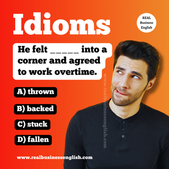Raise vs. Rise in Business English: Meaning, Examples, and Quiz
- Erin West

- Aug 14, 2025
- 4 min read
Updated: Aug 22, 2025

Have You Ever Hesitated Over Raise or Rise?
"Raise" vs "rise" in Business English is a common source of confusion, even for advanced learners. Both words are about something going up, but they’re not interchangeable. If you mix up "raise" vs "rise" in a meeting, email, or presentation, it can sound awkward and distract from your message.
Today, we’ll break down the difference between "raise" and "rise" with clear examples, a quick reference table, and a quiz to check your understanding.
Today's Challenge:
You’re reviewing a project plan with your team. Something in the timeline doesn’t seem realistic, and you’re worried it might cause delays later. The manager hasn’t noticed the problem yet, but you want to make sure it’s addressed. You say:
If something doesn’t feel right, don’t be afraid to ______ the issue.
A) rise
B) rose
C) raise
D) arise
Choose the correct answer and listen to the sentence!
Did you get it right?
What "Raise" Means in Business English
RAISE + object
verb
Present Simple | raise /reɪz/ |
Past Simple | raised /reɪzd/ |
Past Participle | raised /reɪzd/ |
-ing form | raising /ˈreɪzɪŋ/ |
to lift or bring up something (prices, an issue, a question)
We need to raise our prices next quarter.
She raised an important point during the meeting.
The company is trying to raise awareness about the new policy.
ADVERTISEMENT
What "Rise" Means in Business English
RISE
verb
Present Simple | rise /raɪz/ |
Past Simple | rose /roʊz/ |
Past Participle | risen /ˈrɪzən/ |
-ing form | rising /ˈraɪzɪŋ/ |
to go up or increase by itself
Expand your business English with 10 Business English Phrases for Problems and Difficult Situations.
Sales rose by 10% last month.
Costs are expected to rise again this year.
The sun rises at 6:00 a.m.
ADVERTISEMENT
What 'Arise' Means in Business English
ARISE
verb
Present Simple | arise /əˈraɪz/ |
Past Simple | arose /əˈroʊz/ |
Past Participle | arisen /əˈrɪzən/ |
-ing form | arising /əˈraɪzɪŋ/ |
to happen, to start, or to appear
A problem may arise if we don’t finalize the supplier agreement today.
Opportunities often arise when you’re open to new ideas.
A dispute arose over the terms of the contract.
Business English Practice: Raise vs. Rise in Action

Mastering "raise" vs "rise" is easier when you see them in different tenses and contexts. In this quiz, choose the correct word and form for each sentence.
Download Your Business Verbs Practice PDF
ANSWER KEY
1. The CEO plans to ______ the company’s sustainability standards next year.
A) rise B) raise
The correct answer is B) raise.
2. Inflation has ______ sharply over the past six months.
A) risen
B) raised
The correct answer is A) risen.
3. The marketing team is ______ awareness about the new product line.
A) rising B) raising
The correct answer is B) raising.
4. Attendance at the training sessions ______ sharply after the new policy was introduced.
A) rose
B) risen
The correct answer is A) rose.
5. Please ______ your concerns with the HR department before Friday.
A) raise
B) rose
The correct answer is A) raise.
6. The unemployment rate is expected to ______ in the coming months.
A) rise
B) raise
The correct answer is A) rise.
7. Our goal is to ______ productivity without increasing stress.
A) risen B) raise
The correct answer is B) raise.
8. Prices have ______ in nearly every sector this year.
A) rose B) risen
The correct answer is B) risen.
9. She is ______ funds for a local charity event.
A) raising
B) rising
The correct answer is A) raising.
10. Energy costs ______ suddenly after the power shortage.
A) raised
B) rose
The correct answer is B) rose.
You’re on fire! Click below to try another Business English Vocabulary Quiz.
FAQ about “Raise” vs “Rise” in Business English
What is the difference between “raise” and “rise”?
“Raise” needs an object — you raise something (prices, questions, issues). “Rise” does not take an object — something rises by itself (sales, costs, interest rates).
How do I remember when to use “raise” vs “rise”?
Think of “raise” as lift something else and “rise” as go up by itself.
Example: We will raise our fees next year. / Fees will rise next year.
Is “rise” an irregular verb?
Yes. The forms are: rise (present), rose (past), risen (past participle).
Example: Costs have risen steadily since last quarter.
Is “raise” a regular verb?
Yes. The forms are: raise (present), raised (past), raised (past participle).
Example: She raised a concern during the meeting.
Can “arise” be used instead of “rise”?
No. “Arise” means something appears or happens unexpectedly.
Example: Problems may arise if we skip the final review.
Which is more common in business English: “raise” or “rise”?
Both are common, but “raise” appears more often in meetings and emails when talking about bringing up issues or increasing something deliberately.
Can I say “raise up” in business English?
Usually, no. “Raise” already means “lift” or “increase,” so “up” is unnecessary.
Is it correct to say “raise a question” and “rise a question”?
Only “raise a question” is correct.
Example: I’d like to raise a question about the project deadline.
This article was brought to you by RealBusinessEnglish.com, where learning Business English is practical, professional, and just the right amount of fun.
%20(1).png)























Comments